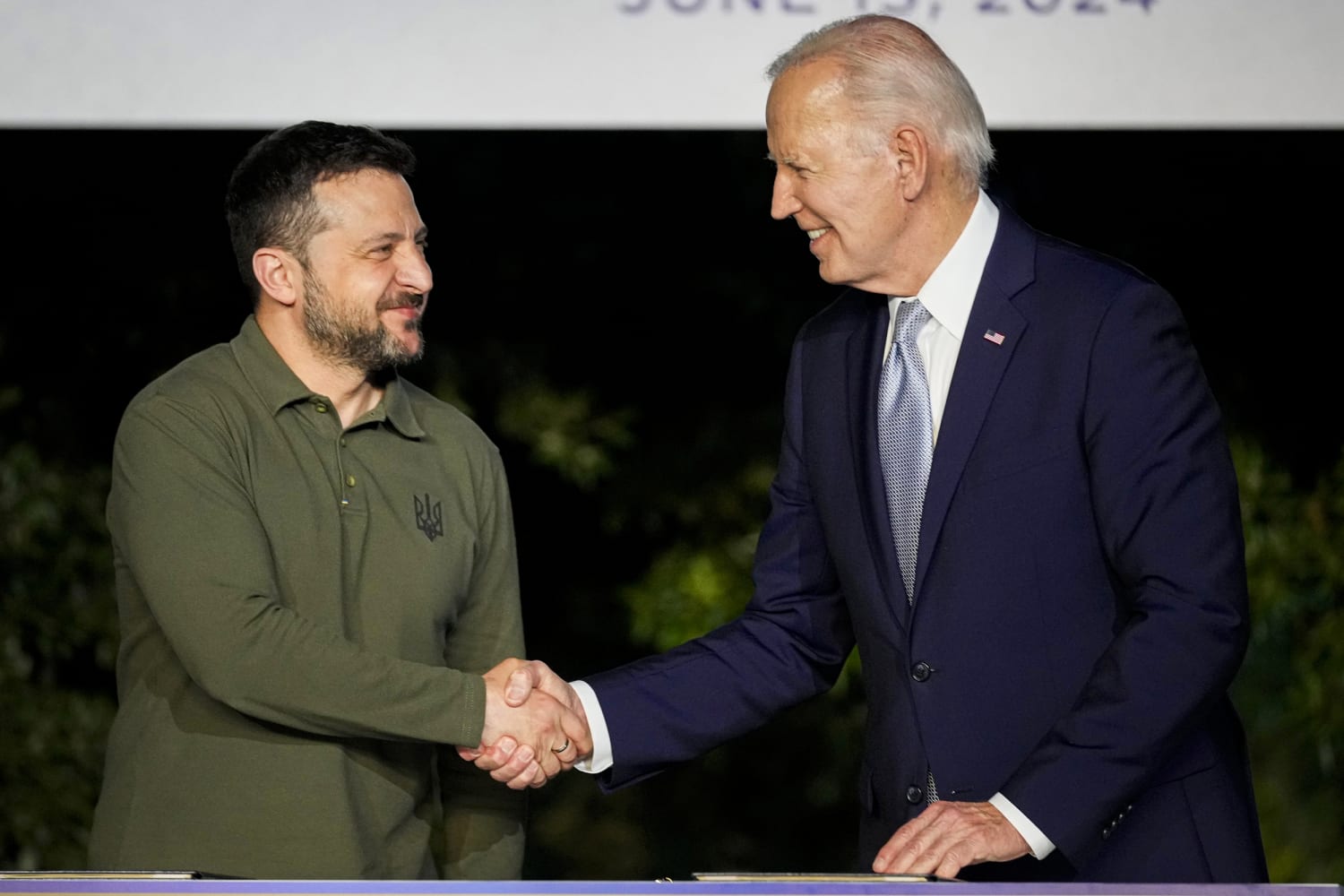BARI, Italy — President Joe Biden and Ukrainian President Volodymyr Zelenskyy on Thursday signed a 10-year bilateral security agreement at an international summit that included a deal on a multibillion dollar loan designed to help Kyiv defend against Russia’s invasion.
“We’re not backing down. In fact, we’re standing together against this illegal aggression,” Biden said at a joint news conference Thursday night with Zelenskyy.
Biden and his counterparts from the wealthiest democratic nations also reached a deal Thursday to give Ukraine a $50 billion loan this year backed by frozen Russian assets, signaling a determined commitment to beat back Russia’s invasion, U.S. officials said.
As Ukraine struggles to preserve its independence amid Russia’s assault, the money will go toward military aid, humanitarian support and reconstruction of the country, a Biden administration official said in a press briefing.
Biden said that taken together, the security agreement and loan deal bolster Ukraine and send an unmistakeable message to Russian President Vladimir Putin, who launched the invasion of Ukraine more than two years ago.
“He cannot wait us out, he cannot divide us,” Biden said. “We’re going to stand with Ukraine.”
The security pact may not be as durable as Biden suggested. Its future likely depends on the outcome of the U.S. presidential election. Donald Trump, the presumptive Republican presidential nominee who sought friendlier relations with Putin during his four-year term, could choose to pull out of the pact if he defeats Biden in November.
“What does [the security agreement] mean if you have a second Trump administration? Probably not much,” Retired Lt. Col. Alexander Vindman, who was director of European Affairs in the Trump White House and is a frequent critic of the former president, said in an interview. “But if there’s a Democratic administration and we get past Trump and MAGA, there will be some consistency” in America’s support for Ukraine.
Back home, Biden’s internationalist approach to foreign policy could be cast aside depending on the outcome of the election.
As president, Trump often sparred with G7 allies, and if he returns, some of his former aides believe he may pull the U.S. out of the NATO alliance, which has served as a bulwark against Russian aggression.
Zelenskyy said at the news conference that he viewed the new security pact as “a bridge” to joining NATO, the post-World War II military defense alliance. That won’t happen right away. Biden has said in the past that Ukraine’s membership in NATO won’t come while the war with Russia still rages.
The U.S. is prepared to commit the entire $50 billion if necessary, but expects other nations will step forward and share the risk, the Biden administration official said. The loan will be secured by interest flowing from about $300 billion in frozen Russian assets.
“How are we going to get repaid? Russia pays,” the official said.
The loan deal was officially announced Thursday during a summit meeting of the Group of Seven (G7) nations, advanced industrial democracies including Germany, Japan, France, the United Kingdom, Canada and Italy.
“There was a shared recognition by every G7 member that the situation on the battlefield remains difficult and that if the war continues, Ukraine is still going to have a large financial need next year and beyond,” the official said, speaking on the condition of anonymity.
Negotiations on the effort have played out since Russian troops invaded Ukraine in February 2022, but political uncertainty may have given the talks renewed urgency. Biden faces a tough re-election campaign, and if he loses, this will be his last G7 meeting.
“This summit is our best chance to act collectively, to close the gap by making Russia pay, not our taxpayers,” the Biden administration official said.
Western allies of Ukraine hope to keep Russia isolated through sanctions and also diplomatic warnings to nations that might be inclined to assist Putin’s forces.
At the news conference, Zelenskyy was asked if China has been aiding the Russian war effort. He replied that he had spoken to “the leader of China by phone” — a reference to Chinese President Xi Jinping.
“He said that he will not sell any weapons to Russia,” Zelenskyy said.
“If he is a respectable person, he will not — because he gave me the word.”
The Chinese Embassy in Washington, D.C., did not immediately respond to a request for comment on Zelenskyy’s remarks.
Biden’s stay in Italy is short: He arrived late Wednesday and will depart Friday night. His schedule is packed with meetings that, apart from Ukraine, will focus on worldwide infrastructure projects and what Western officials say is China’s practice of flooding markets with goods.
A personal highlight of Biden’s visit will be a meeting with Pope Francis, who is also attending the summit and will discuss the risks posed by artificial intelligence. A practicing Catholic, Biden met with Pope Francis in 2021 in Rome and emerged to say the pontiff had told him he should receive communion, despite conservative American bishops who had said Biden’s pro-abortion rights stance should disqualify him from the sacrament.
Biden’s second European trip this month comes at a tumultuous time, politically and personally. The day before the president’s departure, his son Hunter Biden was found guilty on three felony gun charges tied to his drug use.
Asked about his son, Biden said at Thursday’s news conference that he would not pardon Hunter or commute his sentence.
“I’m extremely proud of my son, Hunter,” the president said. “He has overcome an addition. He is one of the brightest, most decent men I know.”
#Biden #Zelenskyy #sign #bilateral #security #agreement #push #Europe #continue #fight #Russia,
#Biden #Zelenskyy #sign #bilateral #security #agreement #push #Europe #continue #fight #Russia
